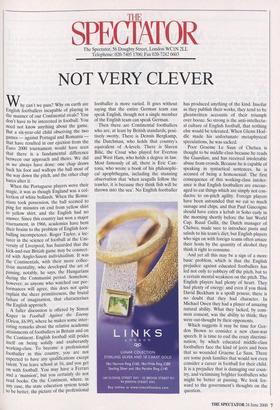SPECIAT THE OR
The Spectator, 56 Doughty Street, London WC1N 2LL Telephone: 020-7405 1706: Fax 020-7242 0603
NOT VERY CLEVER
When the Portuguese players wove their magic, it was as though England was a col- lection of white bollards. When the Roma- nians took possession, the ball seemed to ping for minutes on end from yellow shirt to yellow shirt, and the English had no answer. Since this country last won a major tournament, in 1966, academics have bent their brains to the problem of English foot- balling incompetence. Roger Taylor, a lec- turer in the science of football at the Uni- versity of Liverpool, has hazarded that the kick-and-run British game may be connect- ed with Anglo-Saxon individualism. It was the Continentals, with their more collec- tivist mentality, who developed the art of passing, notably, he says, the Hungarians during the Communist period. Somehow, however, as anyone who watched our per- formances will agree, this does not quite explain the sheer primitiveness, the brutal failure of imagination, that characterises the English approach. A fuller discussion is offered by Simon Kuper in Football Against the Enemy (Orion, £6.99), where he makes some inter- esting remarks about the relative academic attainments of footballers in Britain and on the Continent. English football still prides itself on being solidly and exuberantly working-class. To become a professional footballer in this country, you are not expected to have any qualifications except talent. You leave school at 16, and you get on with football. You may have a Ferrari and a 'mansion', but you certainly do not read books. On the Continent, where, in any case, the state education system tends to be better, the picture of the professional footballer is more varied. It goes without saying that the entire German team can speak English, though not a single member of the English team can speak German.
Then there are Continental footballers who are, at least by British standards, posi- tively swotty. There is Dennis Bergkamp, the Dutchman, who holds that country's equivalent of A-levels. There is Slaven Bilic, the Croat who played for Everton and West Ham, who holds a degree in law. Most famously of all, there is Eric Can- tona, who wrote a book of his philosophi- cal apophthegms, including the stunning observation that 'when seagulls follow the trawler, it is because they think fish will be thrown into the sea'. No English footballer has produced anything of the kind. Insofar as they publish their works, they tend to be ghostwritten accounts of their triumph over booze. So strong is the anti-intellectu- al culture of English football, that nothing else would be tolerated. When Glenn Hod- dle made his unfortunate metaphysical speculations, he was sacked.
Poor Graeme Le Saux of Chelsea is thought to be middle-class because he reads the Guardian, and has received intolerable abuse from crowds. Because he is capable of speaking in syntactical sentences, he is accused of being a homosexual. The first consequence of this working-class intoler- ance is that English footballers are encour- aged to eat things which are simply not con- ducive to on-pitch agility. Foreign players have been astounded that we eat so much sausage and chips, and that Paul Gascoigne should have eaten a kebab in Soho early in the morning shortly before the last World Cup. Ruud Gullit, the Dutch manager of Chelsea, made sure to introduce pasta and salads to his team's diet; but English players who sign on with foreign teams often amaze their hosts by the quantity of alcohol they think it right to consume.
And yet all this may be a sign of a more basic problem, which is that the English prejudice against educated footballers has led not only to yobbery off the pitch, but to a certain mental weakness on the pitch. The English players had plenty of heart. They had plenty of energy; and even if you think David Beckham is a spoilt poseur, there is no doubt that they had character. In Michael Owen they had a player of amazing natural ability. What they lacked, by com- mon consent, was the ability to think; they were out-thought by their opponents.
Which suggests it may be time for Gor- don Brown to consider a new class-war speech. It is time to end the crazy discrimi- nation, by which educated middle-class footballers face the kind of jeers and boos that so wounded Graeme Le Saux. There are some posh families that would not even consider a career in football for their child. It is a prejudice that is damaging our coun- try, and victimising brighter footballers who might be better at passing. We look for- ward to the government's thoughts on the question.


































































 Previous page
Previous page